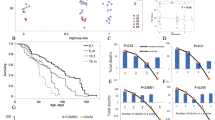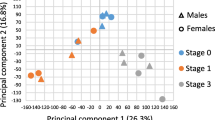Abstract
Maternal nutrition, including the availability of micronutrients such as zinc, influences the health of the offspring. Using Drosophila melanogaster, we studied the impact of zinc deficiency on development and reproduction, as well as the effects of maternal zinc status on the offspring’s expression of zinc transporters across F1 to F3 generations. Zinc deficiency was induced by adding N,N,N′,N′-Tetrakis (2-pyridylmethyl)-ethylenediamine (TPEN) to the diet on which the eggs representing the F0 generation flies were laid. Then, virgin F0 females were mated with control males to produce F1, and subsequently thereafter to generate F2 and F3. Offspring from F1 to F3 were analyzed for body zinc status and zinc transporter mRNA levels. We found that zinc deficiency significantly (p < 0.05) impaired the development of flies, as evidenced by a reduced eclosion rate of zinc-deficient flies. Similarly, zinc deficiency significantly (p < 0.05) reduced the egg-laying rate in F0 flies, highlighting its impact on reproductive functions. Also, zinc levels were consistently lower in the F0 and persisted in subsequent generations for both male and female offspring, indicating transgenerational alterations in zinc status. Furthermore, gene expression analysis revealed significant (p < 0.05) variations in the mRNA levels of dZip42C.1, dZnT63C, dZip71B, and dZnT35C genes across different generations and between male and female offspring. These findings indicate gender-specific dynamics of gene expression in response to zinc deficiency, suggesting potential regulatory mechanisms involved in maintaining zinc homeostasis. Our study emphasizes the detrimental effects of zinc deficiency on development and reproduction in Drosophila and highlights potential implications for offspring and human health.








Similar content being viewed by others
Data Availability
The datasets generated during and/or analyzed during the current study are presented in this paper.
References
Lacagnina S (2020) The developmental origins of health and disease (DOHaD). Am J Lifestyle Med 14:47–50. https://doi.org/10.1177/1559827619879694
Hoffman DJ, Powell TL, Barrett ES, Hardy DB (2021) Developmental origins of metabolic diseases. Physiol Rev 101:739–795. https://doi.org/10.1152/physrev.00002.2020
Roohani N, Hurrell R, Kelishadi R, Schulin R (2013) Zinc and its importance for human health: an integrative review. J Res Med Sci 18:144–157
Maret W, Sandstead HH (2008) Possible roles of zinc nutriture in the fetal origins of disease. Exp Gerontol 43:378–381. https://doi.org/10.1016/j.exger.2007.10.005
Sanusi KO, Ibrahim KG, Abubakar B et al (2021) Effect of maternal zinc deficiency on offspring health: the epigenetic impact. J trace Elem Med Biol Organ Soc Miner Trace Elem 65:126731. https://doi.org/10.1016/j.jtemb.2021.126731
Hara T, Takeda T, Takagishi T et al (2017) Physiological roles of zinc transporters: molecular and genetic importance in zinc homeostasis. J Physiol Sci 67:283–301. https://doi.org/10.1007/s12576-017-0521-4
Kambe T, Tsuji T, Hashimoto A, Itsumura N (2015) The physiological, biochemical, and molecular roles of zinc transporters in zinc homeostasis and metabolism. Physiol Rev 95:749–784. https://doi.org/10.1152/physrev.00035.2014
Willekens J, Runnels LW (2022) Impact of zinc transport mechanisms on embryonic and brain development. Nutrients 14. https://doi.org/10.3390/nu14122526
Navarro JA, Schneuwly S (2017) Copper and zinc homeostasis: lessons from Drosophila melanogaster. Front Genet 8. https://doi.org/10.3389/fgene.2017.00223
Calap-Quintana P, González-Fernández J, Sebastiá-Ortega N et al (2017) Drosophila melanogaster models of metal-related human diseases and metal toxicity. Int J Mol Sci 18. https://doi.org/10.3390/ijms18071456
Hu Q, Duncan FE, Nowakowski AB et al (2020) Zinc dynamics during Drosophila oocyte maturation and egg activation. iScience 23:101275. https://doi.org/10.1016/j.isci.2020.101275
Qu W, Zhu T, Yang D-X (2015) A modified cooling method and its application in Drosophila experiments. J Biol Educ 49:302–308. https://doi.org/10.1080/00219266.2014.967272
Garay E, Schuth N, Barbanente A et al (2022) Tryptophan regulates Drosophila zinc stores. Proc Natl Acad Sci U S A 119. https://doi.org/10.1073/pnas.2117807119
Salgueiro MJ, Zubillaga MB, Lysionek AE et al (2002) The role of zinc in the growth and development of children. Nutrition 18:510–519. https://doi.org/10.1016/S0899-9007(01)00812-7
Xu Y, **ao G, Liu L, Lang M (2019) Zinc transporters in Alzheimer’s disease. Mol Brain 12. https://doi.org/10.1186/s13041-019-0528-2
Saini N, Schaffner W (2010) Zinc supplement greatly improves the condition of parkin mutant Drosophila. Biol Chem 391:513–518. https://doi.org/10.1515/BC.2010.052
Garner TB, Hester JM, Carothers A, Diaz FJ (2021) Role of zinc in female reproduction. Biol Reprod 104:976–994. https://doi.org/10.1093/biolre/ioab023
Gupta G, Srivastava PP, Kumar M et al (2021) The modulation effects of dietary zinc on reproductive performance and gonadotropins’ (FSH and LH) expression in threatened Asian catfish, Clarias magur (Hamilton, 1822) broodfish. Aquac Res 52:2254–2265. https://doi.org/10.1111/are.15077
Sabuz SH, Miah AG, Salma U et al (2018) Effect of dietary zinc supplementation on the reproductive performances of rabbits. Int J AgricSc VetMed 6:1–11
Ziada MS, Hegazy M (2004) Effect of dietary zinc supplementation on reproductive performance of zaraibi male goats. Assiut Vet Med J 50:271–279. https://doi.org/10.21608/avmj.2004.178753
Uriu-Adams JY, Keen CL (2010) Zinc and reproduction: effects of zinc deficiency on prenatal and early postnatal development. Birth Defects Res Part B - Dev Reprod Toxicol 89:313–325. https://doi.org/10.1002/bdrb.20264
Abregú FMG, Caniffi C, Arranz CT, Tomat AL (2022) Impact of zinc deficiency during prenatal and/or postnatal life on cardiovascular and metabolic diseases: experimental and clinical evidence. Adv Nutr 13:833–845. https://doi.org/10.1093/advances/nmac012
Beaver LM, Nkrumah-Elie YM, Truong L et al (2017) Adverse effects of parental zinc deficiency on metal homeostasis and embryonic development in a zebrafish model. J Nutr Biochem 43:78–87. https://doi.org/10.1016/j.jnutbio.2017.02.006
Beaver LM, Truong L, Barton CL et al (2017) Combinatorial effects of zinc deficiency and arsenic exposure on zebrafish (Danio rerio) development. PLoS One 12. https://doi.org/10.1371/journal.pone.0183831
Dechen K, Richards CD, Lye JC et al (2015) Compartmentalized zinc deficiency and toxicities caused by ZnT and Zip gene over expression result in specific phenotypes in Drosophila. Int J Biochem Cell Biol 60:23–33. https://doi.org/10.1016/j.biocel.2014.12.017
Lye JC, Richards CD, Dechen K et al (2012) Systematic functional characterization of putative zinc transport genes and identification of zinc toxicosis phenotypes in Drosophila melanogaster. J Exp Biol 215:3254–3265. https://doi.org/10.1242/jeb.069260
Qin Q, Wang X, Zhou B (2013) Functional studies of Drosophila zinc transporters reveal the mechanism for dietary zinc absorption and regulation. BMC Biol 11. https://doi.org/10.1186/1741-7007-11-101
Lang M, Wang L, Fan Q et al (2012) Genetic inhibition of solute-linked carrier 39 family transporter 1 ameliorates Aβ pathology in a Drosophila model of Alzheimer’s disease. PLoS Genet 8. https://doi.org/10.1371/journal.pgen.1002683
Wang X, Wu Y, Zhou B (2009) Dietary zinc absorption is mediated by ZnT1 in Drosophila melanogaster. FASEB J 23:2650–2661. https://doi.org/10.1096/fj.08-126649
Huang C, Cui X, Sun X et al (2016) Zinc transporters are differentially expressed in human non-small cell lung cancer. Oncotarget 7:66935–66943. https://doi.org/10.18632/oncotarget.11884
Fong LY, **g R, Smalley KJ et al (2018) Human-like hyperplastic prostate with low ZIP1 induced solely by Zn deficiency in rats. Proc Natl Acad Sci U S A 115:E11091–E11100. https://doi.org/10.1073/pnas.1813956115
Zheng D, Feeney GP, Kille P, Hogstrand C (2008) Regulation of ZIP and ZnT zinc transporters in zebrafish gill: zinc repression of ZIP10 transcription by an intronic MRE cluster. Physiol Genomics 34:205–214. https://doi.org/10.1152/physiolgenomics.90206.2008
Faldetta KF, Kohler JE, Blass AL et al (2010) Zinc deficiency causes selective modulation of zinc transporters Zip 10 and ZnT 1 in murine macrophages. J Surg Res 158:255. https://doi.org/10.1016/j.jss.2009.11.235
Yin S, Qin Q, Zhou B (2017) Functional studies of Drosophila zinc transporters reveal the mechanism for zinc excretion in Malpighian tubules. BMC Biol 15. https://doi.org/10.1186/s12915-017-0355-9
Grabrucker S, Boeckers TM, Grabrucker AM (2016) Gender dependent evaluation of autism like behavior in mice exposed to prenatal zinc deficiency. Front Behav Neurosci 10. https://doi.org/10.3389/fnbeh.2016.00037
Hashimoto A, Nakagawa M, Tsujimura N et al (2016) Properties of Zip4 accumulation during zinc deficiency and its usefulness to evaluate zinc status: a study of the effects of zinc deficiency during lactation. Am J Physiol - Regul Integr Comp Physiol 310:R459–R468. https://doi.org/10.1152/ajpregu.00439.2015
Behne D, Kyriakopoulos A, Gessner H et al (1992) Sex-related effects of zinc deficiency on the selenium metabolism in rats. J Trace Elem Electrolytes Health Dis 6:21–25
Cavan KR, Gibson RS, Grazioso CF et al (1993) Growth and body composition of periurban Guatemalan children in relation to zinc status: a cross-sectional study. Am J Clin Nutr 57:334–343. https://doi.org/10.1093/ajcn/57.3.334
Tejeda-Guzmán C, Rosas-Arellano A, Kroll T et al (2018) Biogenesis of zinc storage granules in Drosophila melanogaster. J Exp Biol 221. https://doi.org/10.1242/jeb.168419
Chi T, Kim MS, Lang S et al (2015) A Drosophila model identifies a critical role for zinc in mineralization for kidney stone disease. PLoS One 10. https://doi.org/10.1371/journal.pone.0124150
Acknowledgements
The postgraduate scholarship (CAMRET/2019/PhD/SCH001) received by the author K.O.S is gratefully acknowledged.
Funding
This study was funded through the Institution-Based Research (IBR) grant of the Tertiary Education Trust Fund (TETFUND) of Nigeria given to Usmanu Danfodiyo University Sokoto (TETFUND/DR&D/CE/UNIV/SOKOTO/RP/VOL.1).
Author information
Authors and Affiliations
Contributions
M.U.I. contributed to the study conception and design. Material preparation, data collection and analysis were performed by all authors. The first draft of the manuscript was written by K.O.S. and all authors commented on previous versions of the manuscript. All authors read and approved the final manuscript.
Corresponding author
Ethics declarations
Ethics Approval
No ethical approval is required.
Competing Interests
The authors declare no competing interests.
Additional information
Publisher's Note
Springer Nature remains neutral with regard to jurisdictional claims in published maps and institutional affiliations.
Rights and permissions
Springer Nature or its licensor (e.g. a society or other partner) holds exclusive rights to this article under a publishing agreement with the author(s) or other rightsholder(s); author self-archiving of the accepted manuscript version of this article is solely governed by the terms of such publishing agreement and applicable law.
About this article
Cite this article
Sanusi, K.O., Abubakar, M.B., Ibrahim, K.G. et al. Transgenerational Effects of Maternal Zinc Deficiency on Zinc Transporters in Drosophila melanogaster. Biol Trace Elem Res (2024). https://doi.org/10.1007/s12011-024-04071-1
Received:
Accepted:
Published:
DOI: https://doi.org/10.1007/s12011-024-04071-1




